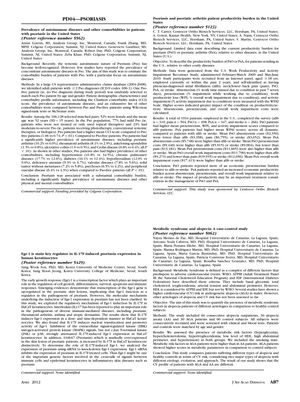Psoriasis and Psoriatic Arthritis Patient Productivity Burden in the United States
April 2012
in “
Journal of the American Academy of Dermatology
”

TLDR Psoriasis patients have more comorbidities, including autoimmune diseases and other health issues, than those without psoriasis.
The document from 2012 presents a study that aimed to estimate the comorbidity burden of patients with psoriasis (Pso), with a focus on autoimmune diseases. The study used a large US administrative claims database from 2004-2008 to identify adult patients with ≥2 Pso diagnoses and matched them with Pso-free patients by age and gender. The study included 106,128 matched pairs, with a mean age of 52 years and 52% female. It was found that Pso patients had a higher mean Charlson comorbidity index (CCI) score (1.06) compared to Pso-free patients (0.74). Pso patients also had a significantly higher prevalence of autoimmune diseases such as psoriatic arthritis (10.2%), rheumatoid arthritis (8.1%), ankylosing spondylitis (1.5%), ulcerative colitis (1.0%), and Crohn disease (0.8%), as well as other comorbidities like hypertension, chronic pulmonary diseases, diabetes, hypothyroidism, deficiency anemias, valvular diseases, solid tumor without metastases, psychoses, and peripheral vascular disease. The conclusion was that psoriasis is associated with a substantial comorbidity burden, including a significantly higher prevalence of autoimmune diseases and other physical and mental comorbidities. The study was funded by Celgene Corporation.







